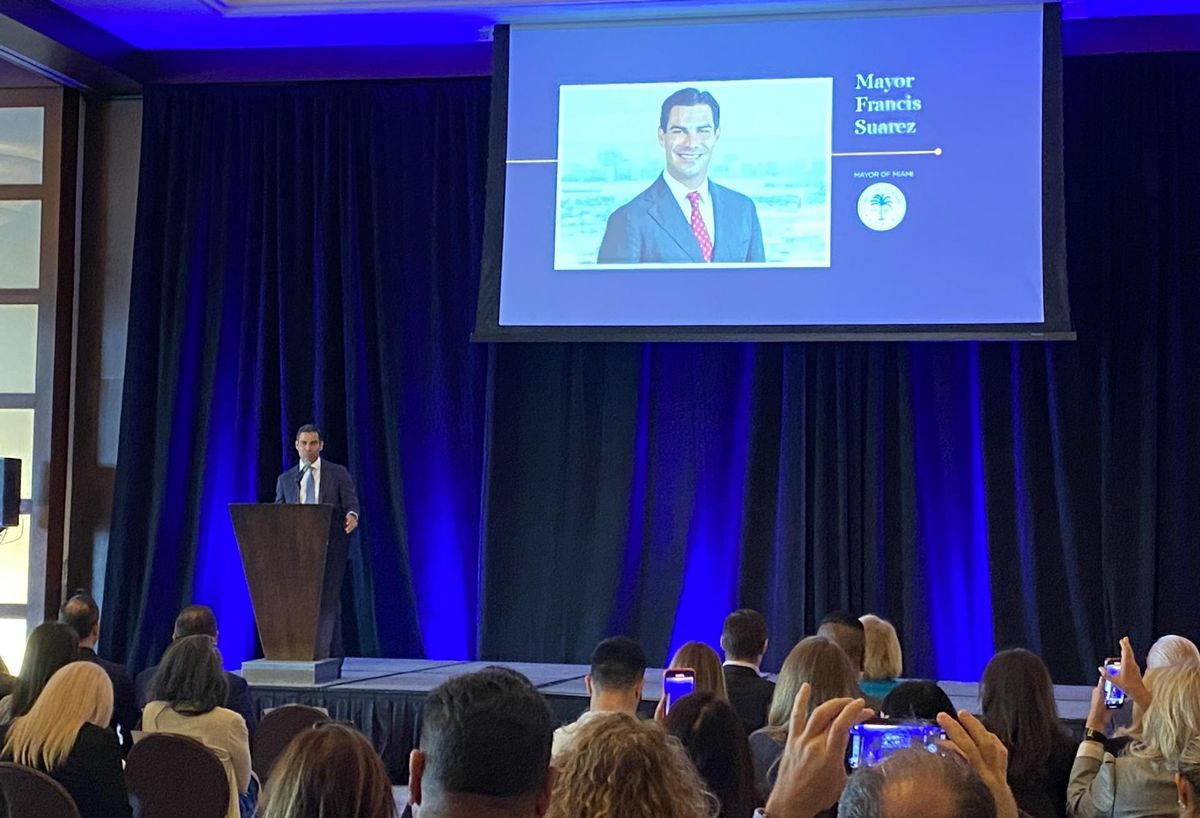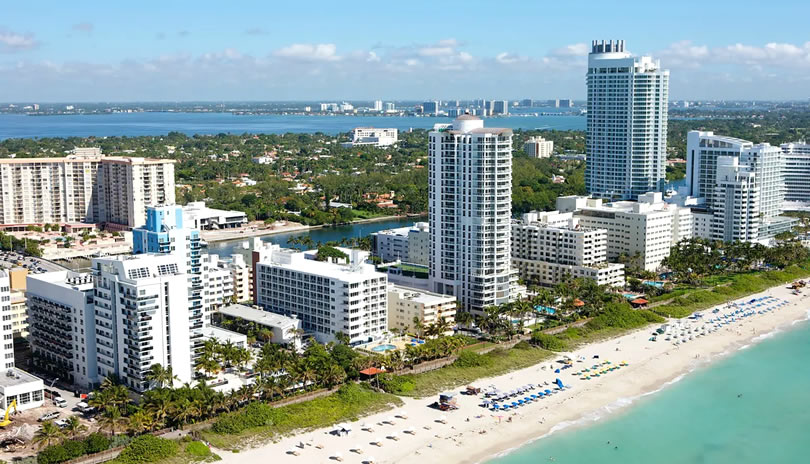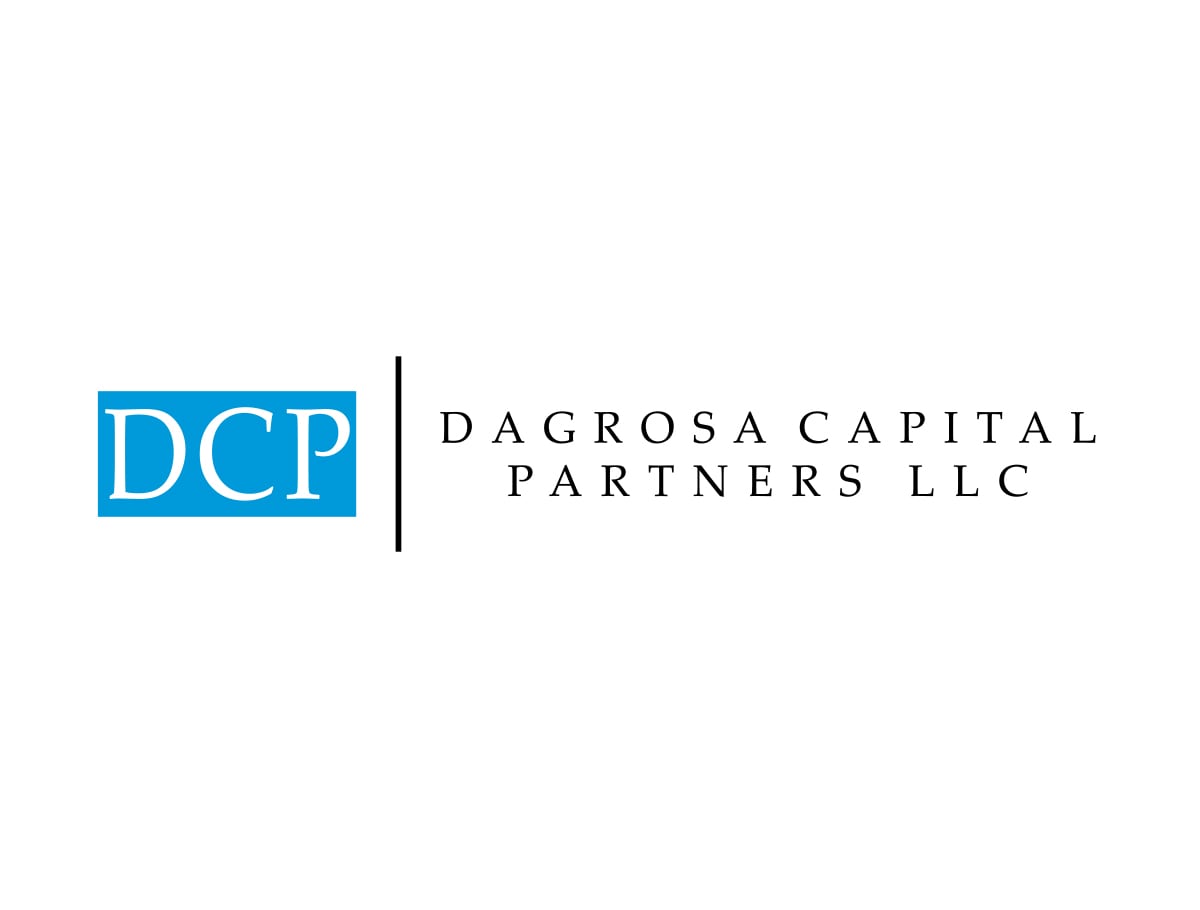Developer Edgardo Defortuna is negotiating with “key brands” for his and Shahab Karmely’s planned luxury waterfront condo project along the Miami River.
One River Point, designed by Rafael Viñoly, was first proposed in the last cycle. It came back to life when Defortuna, CEO of Fortune Development Group, joined Karmely’s KAR Properties last year.
“Buyers prefer branded [buildings]. I wouldn’t doubt it for a minute,” Defortuna said. “Any kind of hospitality brand or hotel brand, like the St. Regis or Ritz-Carlton, immediately [indicates] great service or attention to detail.”
South Florida has become a hub for branded condo projects, with more than two dozen in the planning stages or under construction in the tri-county region, with the majority in Miami-Dade County, according to The Real Deal’s analysis. Fortune and Douglas Elliman have the exclusive sales and marketing contracts for most.
Defortuna’s firm is involved in more than half a dozen of the branded developments. Comparing the effects of branding, he offered examples of his completed oceanfront towers, Jade Signature and the Ritz-Carlton Residences, both in Sunny Isles Beach.
“People perceive the Ritz-Carlton Residences as a superior building, but from a technical perspective, Jade Signature is superior,” Defortuna said, adding that buyers prefer the luxury hotel-level of service. “Perception is practically all you need in order to move forward.”
Hospitality and car brands have been eager to lend their names, design teams, programming and management to luxury residential projects in South Florida over the last decade.
The recent boom in the condo market has led to even more branded projects. It’s easy to see why: Developers can sell the units for a higher price. And besides collecting an initial fee from developers, brands stay on to manage the properties for years, if not indefinitely.
How it works
Developers pay branding fees, which can range from 3 percent to 8 percent of sales. Most branding agreements are for 10 years, with extension options and the expectation that the brand will be in place for much longer. Once the building is delivered, owners pay brand management fees as part of their HOA dues.
Some branding deals are permanent, like Armani/Casa’s agreement with the Residences by Armani/Casa condo tower in Sunny Isles Beach, said Craig Studnicky, CEO of ISG World. Related Group and Dezer Development partnered on the oceanfront project, which they completed in late 2019.
During the design and construction stages, “the brand will insist that condos and amenities are at a certain standard,” typically “more than what the developer planned on spending,” he said.
In exchange, “the developer gets instant worldwide recognition of their project” and “can sell these for more money than the project next door,” Studnicky added. Branded condos are sometimes marketed for sale at 20 percent to 30 percent markups compared with their unbranded peers.
Brands are especially handy for larger developments, Studnicky said, because they help accelerate sales during preconstruction, the most sensitive time for developers. But he is skeptical that they add significant value to buyers once they decide to sell.
“Resale prices are all the same,” he said. “What happens when the developer leaves, the champagne is over and all the parties are done? The three L’s are all that matters: location, location, location.”
There is at least one exception to that, though it also proves Studnicky’s point about location. A resale at the Four Seasons Residences at the Surf Club, one of the only new luxury developments in Surfside, closed last year for $22.8 million, about 180 percent higher than the preconstruction price paid.
The per-square-foot price of nearly $5,800 per square foot set a record in Miami-Dade County that still holds today.
The more expensive the development, the likelier that it will be associated with a top brand. Dan Catalfumo, who is developing Ritz-Carlton Residences in Palm Beach Gardens, said his buyers expect the quality of service associated with Ritz-Carlton. Unit prices range from about $4 million to $8 million.
“It’s like going on vacation,” he said. “You don’t call the Ritz-Carlton to ask if they have valet …. It’s just a given.”
He just began sales of the 106-unit luxury condo building and is negotiating with lenders for the project’s construction loan. Construction could begin in May.
“When we first assembled the property, we had not planned on branding it, and then we started to think about where the buyers were coming from,” Catalfumo said. “There has never been a Ritz that has never been sold out. It’s only going to go up in value.”
Catalfumo said the project has a 20-year management agreement that will automatically renew.
To brand or not to brand
Some developers have instead created their own brands, like Turnberry in Aventura and Acqualina in Sunny Isles Beach.
“If most of the big brands are taken, how do you differentiate?” said Jay Parker, CEO of Douglas Elliman. Elliman will lead sales of the Auberge Resorts-branded Shore Club in Miami Beach, The Residences at Shell Bay by Auberge Resorts in Hallandale Beach, and both Edition-branded buildings planned in Miami’s Edgewater and in Fort Lauderdale.
Parker said Elliman is working with developer David Martin to create “several non-branded” developments that still have their own brand.
Others are working with major hotel operators, like Okan Tower in downtown Miami, which Hilton will manage.
Ibrahim Fesli, an Okan Group board member, said Hilton was the developer’s first choice for the tower, which will include condos, short-term rental units, a Hilton hotel and amenities.
“They’re everywhere. They’re in more than 100 countries. Wherever you go in the world, there’s the Hilton brand,” Fesli said.
In addition to Hilton and Auberge, Marriott (owner of brands that include St. Regis, Ritz-Carlton and Edition), Aman, Rosewood and the Standard Hotels all have residential buildings in the works. Restaurant and hospitality companies like Casa Tua, Cipriani and Mr. C are also in the mix. Major Food Group planned to brand developer Michael Stern’s Brickell skyscraper, but that deal fell apart last year.
The influx of buyers escaping their home states for lower taxes and warmer weather, particularly those from New York, propelled a wave of new developments during the pandemic. E11even Hotel & Residences, PMG and E11even Partners’ nightclub-branded project in Miami, has gotten significant attention for selling out quickly in 2021.
Later that year in Midtown Miami, developer Carlos Rosso and his partner Alex Vadia launched the Standard Residences in Miami. It’s now 70 percent presold, Rosso said.
“We nailed it right on the head when we picked the Standard,” he said. “The success of the sales show the strength of the brand in a location like Midtown.”
Standard Hotels will handle food and beverage operations, events and regular programming, including yoga classes, pickleball events and tarot readings. The hotel brand also took the lead on the building’s design.
Two developers are working with major automotive brands — Dezer Development with Bentley Motors, and G&G Business Development with Aston Martin.
Dezer tried it first with the Porsche Design Tower. Though the brand he worked with is Porsche Design, not the automobile manufacturer, the oceanfront high-rise in Sunny Isles Beach is tailored to the car enthusiast with its Dezervator (a patented car elevator) that delivers residents directly to their in-unit garages encased in glass.
Apart from cars and hospitality, Related Group also has skin in the game. The Miami-based developer’s branded projects include the planned Baccarat Residences in Brickell, and a Casa Bella by B&B Italia tower in downtown Miami. The latter replaces canceled plans for an Auberge-branded building.
Though more launches are planned this year, brokers and developers say there’s no denying demand has slowed. In October, Related and its partner Integra Investments downsized their St. Regis Residences, Miami development by eliminating a second tower with smaller, less expensive units. Related said buyers preferred to be in a development with fewer, larger and more expensive units.

(St. Regis Residences)

(St. Regis Residences)
“Of course you have to measure the demand of the market and not compete with yourself,” Defortuna of Fortune said, regarding the influx of these projects. “We’re all trying to differentiate ourselves and create some sort of a special offering for the buyer.… Having a brand is better than not having it.”


